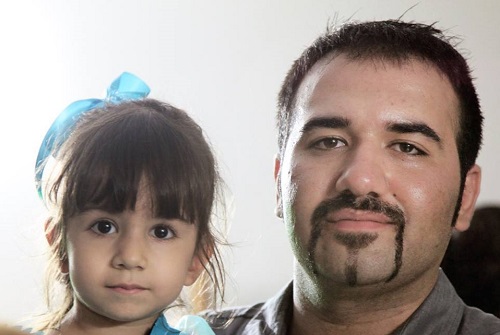Groups within Iran are reporting the blogger Soheil Arabi, is facing an imminent death by hanging, for the “crime” of his Facebook posts, which the Iranian government views as insulting Islam.
As an Iranian-rights group reports, Soheil Arabi, has been imprisoned, flogged, fined, and sentenced to death because of articles he published on Facebook. He is the father of a five -year-old daughter.
A Twitter campaign for his freedom was started at #SaveSoheil.
A petition calling for the freedom of Soheil Arabi, has received thousands of signers, but the Iranian government remains unmoved. Facebook has a website of petitions seeking the freedom of Iranian political prisoners, including Soheil Arabi.
Human Rights Watch has reported that “[a] Tehran criminal court had convicted him in August of sabb al-nabbi, or ‘insulting the prophet,’ referring to the Prophet Muhammad, which carries the death penalty.” ” On November 24, 2014, Iran’s Supreme Court upheld a criminal court ruling sentencing Soheil Arabi to hang. The court transferred his file to the judiciary’s implementation unit, opening the way for his execution.” “Nastaran Naimi, Arabi’s wife, told Human Rights Watch that intelligence agents linked with Iran’s Revolutionary Guards arrested her and her husband at their home in Tehran in November 2013. ”
Iranian blogger Mojtaba Safari (based in Canada) writes that: “Soheil created his Facebook page in August 2012, naming it “a generation that does not want to be silent.” He criticized the regime as the cause of socio-eco-political problems in the country. ” “The problem is that in Iran, almost any criticism of the system can be regarded as ‘disrupting the internal security of the state,’ and punished by death. This article has been used to execute thousands of Iranian dissidents since the 1979 Revolution. A few months ago, Iran executed Mohsen Amir-Aslani, who was charged with insulting the prophet Jonah. Another similar case was the Iranian blogger, Sattar Beheshti, who was tortured to death in November 2012 for criticizing the Islamic Republic of Iran on Facebook.” “Iran is a perfect example of what a religious state is capable of, and why the ideas of democracy and freedom are not compatible with Sharia law.” “A state that doesn’t respect its people will not respect its neighbors either. The brutal Iranian theocracy is not only a threat to its own people but also a threat to the world. Pressuring the regime and saving Soheil Arabi’s life is a matter of Iranian and global importance. ”
Responsible for Equality And Liberty respects the dignity of our religious beliefs, but we know that without a commitment to our universal human rights, freedom of speech, and freedom of press, those who justify “blasphemy” laws and punishments, will have such arguments turned against them to deny their own freedom of religion. This is the endless circle of attacks on human rights, human dignity, and human lives, when we reject our Universal Human Rights, as described in the Universal Declaration of Human Rights as a starting point for shared respect, law, and order.
We have seen with both Muslim, Christian, and other faiths, where the argument of “blasphemy” is used by someone of another faith to deny freedom of religion to others.
In Iran, the Shia-based Iranian government is using such a blasphemy law to deny the freedom of Soheil Arabi and others, and seek the death penalty against him. But in Pakistan, those Shiites practicing their Muslim faith are attacked, killed, and their houses of worship destroyed by those extremist who claim their Shia faith is a “blasphemy.” While the Iranian court is planning the execution of Soheil Arabi, in Pakistan, Shiite have recently buried their dead killed by an extremist who bombed the Shia Imambargah mosque, on the view that the Shia religion itself is a “blasphemy.” As the AP has reported, “Sunni extremist groups like those believe Shiites are infidels, and their presence has fueled sectarian attacks.”
The practice of violence and oppression for “blasphemy” has long caused death and violence, not just to Iranian people, but the people of the Shia faith around the world. Shiites and Shia houses of worship have long been the target and victims of such “blasphemy” laws and attitude by extremists.
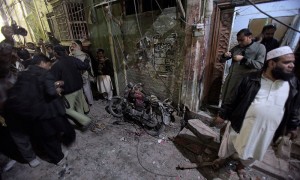
Blasphemy? Shiite Mosque in Rawalpindi, Pakistan Attacked by Extremists Rejecting Shia Religious Practice as Blasphemy (Source: AP)
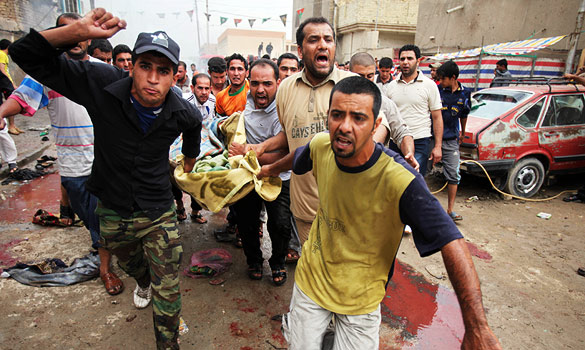
Blasphemy? 69 Shiites Killed in Bomb Attack by Extremists Rejecting Shia Religious Practice as Blasphemy (Photo: London Time/Alice Fordham)
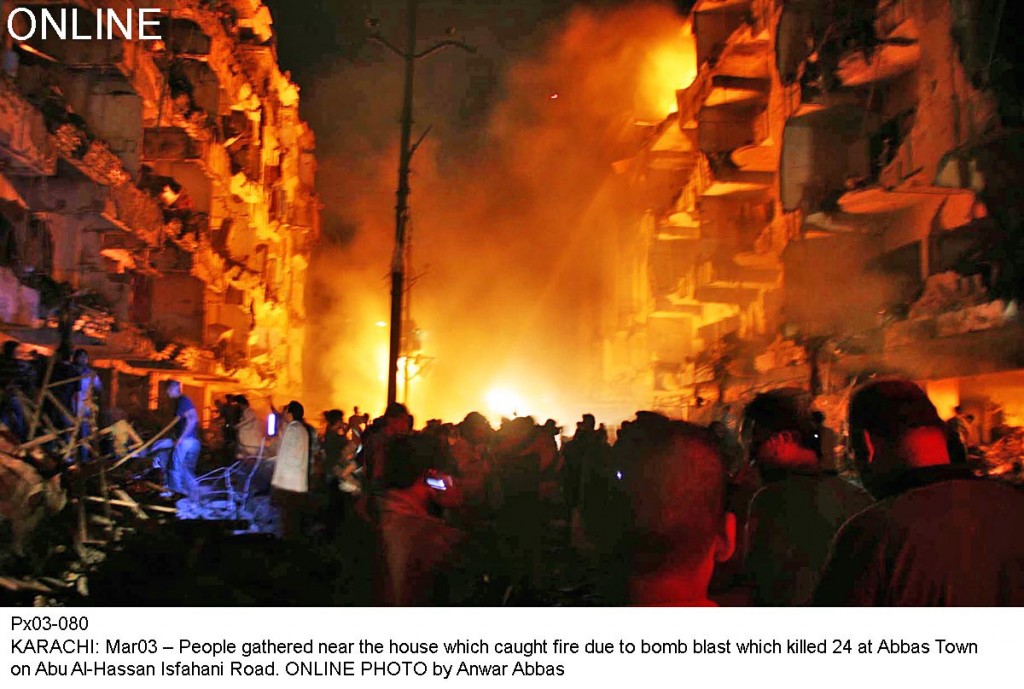
Blasphemy? Attack on Shiites in Karachi, Pakistan, Killing Nearly 50 by Extremists Who Reject Shia Religious as "Blasphemy" (Source: Anwar Abbas)
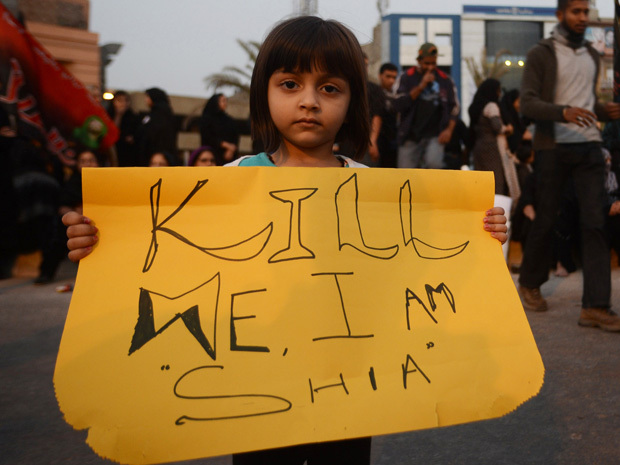
Blasphemy? Pakistan Shia Girl Protests Murders of Shiites by Sunni Extremists Killing Shiites as "Infidels," based on their extremist view that the Shia Religion is "Blasphemy" (Source: ASIF HASSAN/AFP/Getty Images)
So if these extremist measures and violence based on rejecting the freedom of others as “blasphemy” against Shiites in Pakistan and other parts of the world is wrong, how is it right for Iran to use such “blasphemy” law to condemn Soheil Arabi to death for his universal human rights of freedom of speech?
In Pakistan, the Sunni-based Pakistan government is using such a blasphemy law to deny the universal human rights of Sunni Muslims, Shia Muslims, and people of all faiths, especially minority Christians. But the results are that even the Pakistan Ambassador to the United States was charged with “blasphemy,” Muslims are imprisoned by those with a grudge, the perspective of “blasphemy” justifies the killing of minority Muslims, their houses of worship, the oppression, murder, and destruction of houses of worship of minority Christians, Hindu, and Sikh.
In the Vatican, Pope Francis has recently argued that those “offending” the religious views of others should normally expect a “punch in the nose.” While Pope Francis went to make obligatory (and clearly contradictory) remarks that one should never kill for their God, and rejecting terrorism, Pope Francis’ comments come in the backdrop of 185 churches burned in recent months in Nigeria by Boko Haram and up to 60 churches burned on the weekend of January 17-18, 2015 in Niger. His comments come in the context of Christians being imprisoned, burned to death, churches burned down, and entire towns destroyed by those offended by “blasphemy.”
In Responsible for Equality And Liberty’s unequivocal support for our universal human rights, we do not offer disrespect to religious leaders of these faiths or these theocratic nations. We challenge those extremists, theocratic governments and leaders, and those who believe that our universal human rights are expendable. We have learned and the world has clearly seen that such universal human rights are essential.
Those who defend the right to use legal and violent means to punish “blasphemy” must realize that this argument will ultimately be turned by others against them and their faith. These creates a vicious circle of destruction on human rights, human liberty, and human lives.
Responsible for Equality And Liberty offers an outstretched hand, not an upraised fist, to our brothers and sisters in humanity, including those who have lost their way on our universal human rights. We urge them to reconsider their position and to support the universal human rights of all people and all faiths, not just because it is the right thing to do, but also because without those universal human rights, their human rights are also endangered.
We urge all people to be responsible for equality and liberty.
